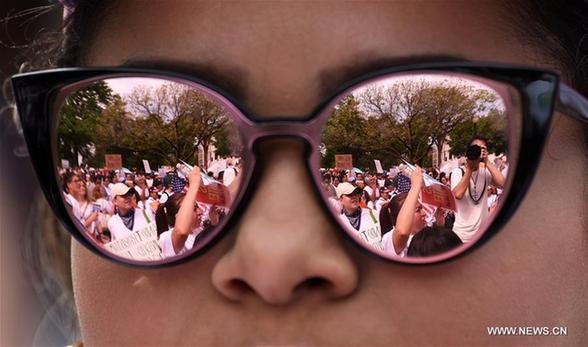Finding talent in a rapidly changing and uncertain 'World of Work'
- By Eugene Clark
 0 Comment(s)
0 Comment(s) Print
Print E-mail China.org.cn, May 2, 2017
E-mail China.org.cn, May 2, 2017
|
|
|
A woman attends Immigrants and Workers March protesting against immigration policies at Dupont Circle in Washington D.C., the United States, on May 1, 2017. Thousands of Americans on Monday took to streets in major U.S. cities including Washington D.C., Chicago, New York and Los Angeles to join May Day demonstrations for the rights of workers, women and immigrants. [Photo/Xinhua] |
The celebration has evolved over the years, assuming different forms in different countries. In the early days, it was a public protest for union rights; sometimes it's been a show of solidarity for various socialist causes.
In the U.S., it has now been captured by various groups as an opportunity to voice opposition to President Donald Trump. It has also become a holiday, focusing on shopping and the worker as a consumer.
These changes mirror the reality that the nature of work itself has changed and will continue to do so even more in the years ahead. In the agricultural age, the cultivation of rice, wheat and other crops changed the structure of society and defined work in ways closely related to the land. The Industrial Age demanded factory workers while at the same time lessening the need for human labor in the fields, accelerating a flow to the cities and growing urbanization.
We are now in the beginning of an Information Age where work has become highly specialized. As computers, big data, artificial intelligence and other technologies converge, many of our existing jobs are being taken over by computers and other machines.
While this will create some new, highly-skilled jobs, many routine jobs done by millions of ordinary people will no longer be required, becoming "surplus to requirements." For one example, self-driving vehicles could eventually eliminate millions of jobs.
In this environment, the major role of many will be not as workers but as consumers as we continue to give up our personal data to search engines that tailor goods and services to our specific individual needs.
This new environment impacts many sectors. For example, presently, people look to universities to prepare students for work. Yet it is clear that the gap is widening between what is required for successful work and what students study at university.
New work contexts also challenge the legal system as it struggles to deal with the ramifications of workplace privacy, challenges to security as people bring their own mobile devices to work and workers themselves work from home and participate in virtual teams. In this "work cloud" environment and with the "internet of things," information governance is proving to be a major challenge for both public and private sector organizations.
This brave new world will cause governments and other organizations to redefine the very nature of work, and this is likely to lead to greater inequality between the many unskilled workers and the few elite with special high-order skills in great demand. In a global market place, this elite will be able to move easily, and companies, countries and other organizations will have to compete aggressively to attract and keep them.
Technology is also impacting the nature of work. It changes where we work, as the home becomes the workplace. It changes the work we do and how we work with a greater premium today on the need to continually unlearn old and switch to learning new skills, new roles, and new technologies.
It changes when we work, as we adapt to a 24/7 existence. It raises new issues as, for example, people must learn to work in virtual teams and leaders must learn to use continuously-evolving new technology in new ways to lead virtual tribes.
It raises concerns such as private monitoring of workers, DNA and other testing and dangers to security when technology is increasingly mobile, people bring their technology to work with them and the potential damage is huge given the growing "internet of things."
Attracting and keep talented workers and finding the right people for the job is part art, part skill, part science and part luck. Diagnostic tests can be used for a number of purposes, especially for employee selection. These tests can assess psychological fitness as well as evaluating specific skills such as sales ability, ability to work with people, collaborative skills, leadership skills, project management skills, etc.
Other assessments measure how well the person fits a particular organization. Other assessments measure the applicant's motivation to undertake the particular job. Note that more often than not, we hire a person because of their talents or competencies, and fire a person because they do not fit the organization.
This suggests that best hiring practices should involve both "competency" screening as well as screening for organizational fit and the applicant's motivation for the position. It will also require organizations and workers who, above all, are willing and able to keep learning and constantly adapt to an ever-changing environment.
Eugene Clark is a columnist with China.org.cn. For more information please visit:
http://www.china.org.cn/opinion/eugeneclark.htm
Opinion articles reflect the views of their authors only, not necessarily those of China.org.cn.







Go to Forum >>0 Comment(s)